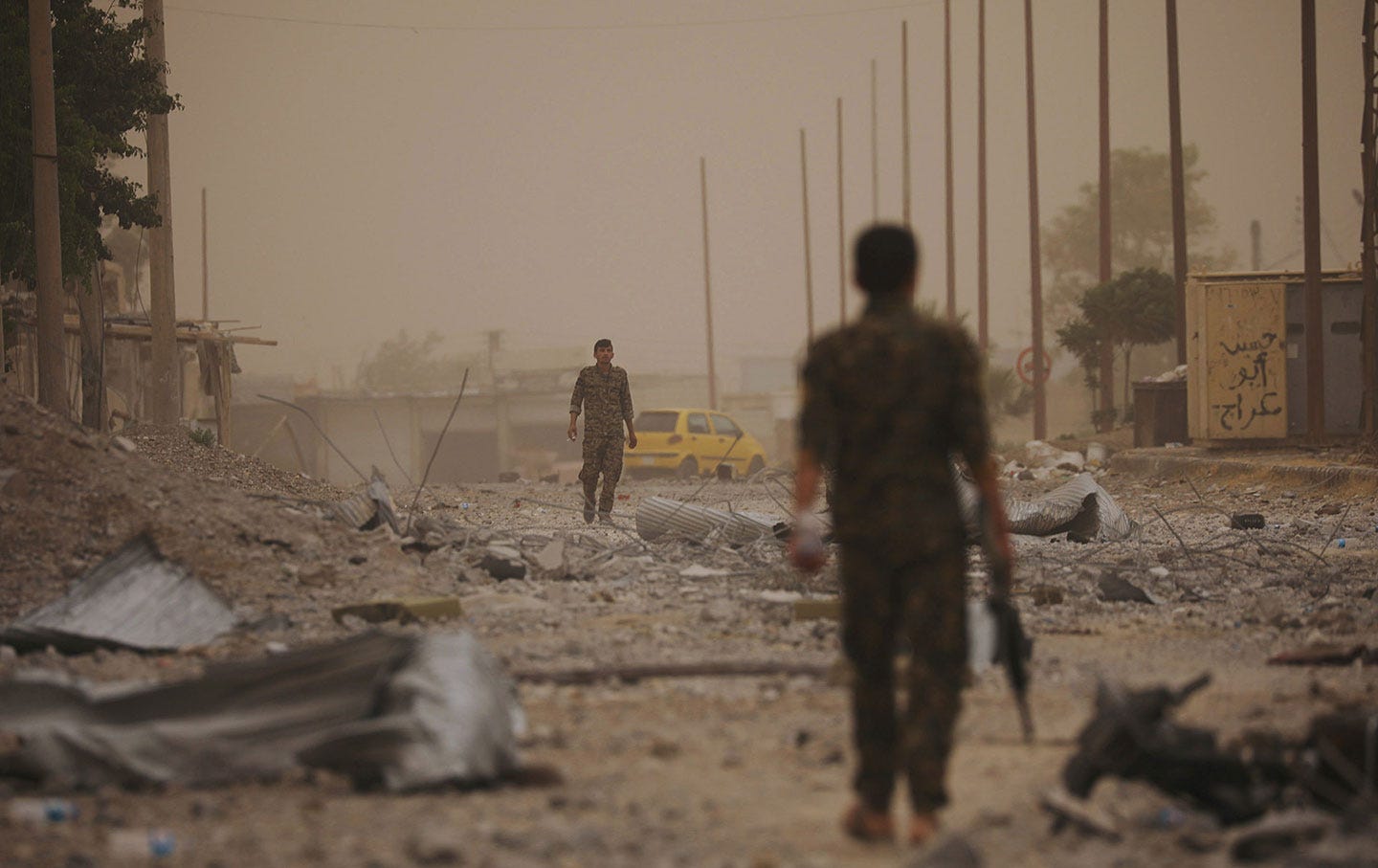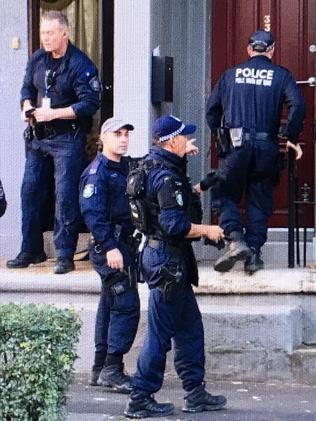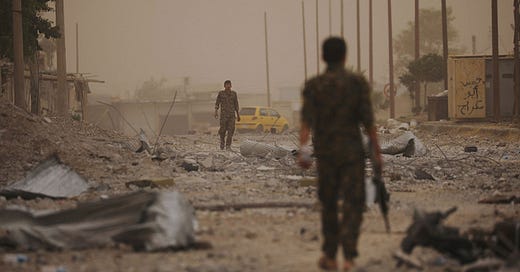
Raqqa, Syria
"How's the new book going?" someone asked.
"The central event hasn't happened yet," Old Alex replied, and the thread disappeared into ordinary concerns as quickly as it came.
There's no way you're going to fit in anywhere here.
That night terror raids on Cleveland Street in Surrey Hills, Sydney, where he had spent so much time.
Life took place behind closed doors.
A cartoonist lived down the road.
They were up to no good, always.
An old, moldy grey blanket was blown vertical in the wind, every rumple, every movement, coruscating ravines.
There was treachery everywhere.
The experts came. The experts went. Everyone was on a government payroll. There had been days when he had longed to sellout, if only someone was buying.
Forgive me. Why hast thou forsaken?
The landscape was undulating.
For he so loved.
And became trapped.
The gig is up.
We know you're not human.
"What's the answer," a querulous old man demanded of him.
"To make democracy more attractive, to return to the original ideal of a participatory democracy, which is not what we have now."
As far as the querulous old man was concerned, bombing Muslims back to the stone age was the only solution. Teach them a lesson.
He watched a slavering crowd in Afghanistan kill a woman accused of burning a Koran.
He thought briefly of intimate times on Cleveland Street, an unlovely traffic thoroughfare full of dust and decay, until renovation mania and soaring prices from overpopulation gripped the real estate market.
Operation Mockingbird.
The manipulation of the mainstream media by the CIA.
Their experts had come to Australia to train the locals, and achieved very well. The Australian media had become so remarkably anodyne, so entirely non-controversial, so reliant on the spewing verbiage of the political class there was no answer. It made no sense. It could not have devolved this quickly without gross manipulation. Interference.
We abandoned our sovereignty for no good reason.
Destroyed public discourse.
Surrendered to the bureaucracy's inane anti-capitalist orthodoxies. Manned, as they were, by the battalions of useful fools which had spewed forth from the institutions of "higher" learning, those preening tax payer funded centres of excess where the long march through the institutions was complete, and self-serving lecturers purported to shock their bourgeois students from the clasp of their middle class upbringings. It was all so tired. In a darkening, muffled clime. Where the shadows of the emissaries flickered around a circular horizon. The past destroyed, the future born.
Indeed, the landscape undulated, the populace, or those that still remained cognisant, thrown into a freezing wind.
THE BIGGER STORY:

A TERRORIST plot to bring down a domestic flight with a bomb was at the centre of a series of raids across Sydney yesterday targeting an alleged Islamic extremist cell.
Wearing gas masks and ballistic armour, backed by fire crews and specially trained paramedics, officers from the Joint Counter Terrorism Team stormed three properties in Sydney’s west — at Sproule St, Lakemba, Renown Ave, Wiley Park, and Victoria Rd, Punchbowl — and a terrace on Goodlet Lne, Surry Hills, in the inner city.
The raids had been planned for several days and are understood to have been brought forward for operational reasons.
At Surry Hills, where parts of Cleveland St were shut down from 1pm to create an exclusion zone, a man shrouded under a bed sheet was escorted into an ambulance by police before being taken into custody.
As the arrest unfolded, paramedics attended to the man, who had a bandage covering his head, and a woman whose wrists had been cable-tied.
An elderly woman was also escorted from the scene by police, her head covered by a leopard-skin print jacket.
Several women wearing hijabs were also at the scene, as was a young boy.
When asked why he’d been arrested, the man said “No idea”, then added: “They bashed me.”
Neighbours described the man’s parents as a “lovely couple” who held barbecues every Sunday.
Relatives of two of the men arrested told media last night that they “love Australia”.
Neighbour Kate Harrison said: “There must have been at least 40 riot squad police with huge guns.”
Witnesses reported hearing a lot of screaming and dogs barking as police raided the property.

Islamic State fighters have now essentially been defeated in Mosul after a nine-month, US-backed campaign that destroyed significant parts of Iraq’s second largest city, killing up to 40,000 civilians and forcing as many as one million more people from their homes. Now, the United States is focusing its energies—and warplanes—on the ISIS-occupied areas of eastern Syria in an offensive dubbed “Wrath of the Euphrates.”
The Islamic State’s brutal treatment of civilians in Syria has been well reported and publicized. And according to Lieutenant General Stephen Townsend, the commander of the US-led war against ISIS in Iraq and Syria, the battle to “liberate” these regions from ISIS is the “most precise campaign in the history of warfare.”
But reports and photographs from Syrian journalists and activists, as well as first-person accounts from those with family members living in areas under US bombardment, detail a strikingly different tale of the American offensive—one that looks a lot less like a battle against the Islamic State and a lot more like a war on civilians.
These human rights groups and local reporters say that, across Syria in recent months, the US-led coalition and US Marines have bombed or shelled at least 12 schools, including primary schools and a girls’ high school; a health clinic and an obstetrics hospital; Raqqa’s Science College; residential neighborhoods; bakeries; post offices; a car wash; at least 15 mosques; a cultural center; a gas station; cars carrying civilians to the hospital; a funeral; water tanks; at least 15 bridges; a makeshift refugee camp; the ancient Rafiqah Wall that dates back to the 8th century; and an Internet cafe in Raqqa, where a Syrian media activist was killed as he was trying to smuggle news out of the besieged city.
The United States is now one of the deadliest warring parties in Syria. In May and June combined, the US-led coalition killed more civilians than the Assad regime, the Russians, or ISIS, according to the Syrian Network for Human Rights, a nongovernmental organization that has been monitoring the death toll and human rights violations in Syria since 2011.
“This administration wants to achieve a quick victory,” Dr. Fadel Abdul Ghany, chairman of the Syrian Network for Human Rights recently told me. “What we are noticing is that the US is targeting and killing without taking into consideration the benefits for the military and the collateral damage for the civilians. This, of course, amounts to war crimes.”
And nowhere is this war against civilians more acute than in ISIS-occupied Raqqa, where trapped families are living under dozens of airstrikes every day.



